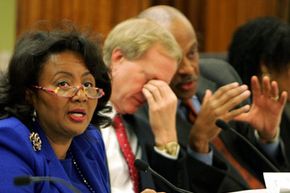New Hampshire, the hotbed of presidential primary politics, is known for its town meetings. At these annual gatherings, every citizen eligible to vote can stand up and make his or her opinion heard. It's considered one of the truest forms of democracy in the United States.
In Manchester, the state's largest city, a town meeting style vote session would be impossible due to sheer numbers. Added to this volume is the complexity and diversity of decisions that even a small city requires. According to Manchester deputy city clerk Kathie Gardner, the key is the division of the city into wards or districts. Manchester has 12 wards within the city.
Advertisement
"Each one acts like a small town," Gardener says. "Each ward has its own character and needs. The aldermen do their best to serve their [ward's] needs."
Manchester's wards and aldermen are at the heart of a form of representative government called a city council. Each city is sectioned off into chunks of space, called wards or districts, and residents from each piece elect a representative, usually known as an alderman or a councilor. These representatives listen to their constituents and bring their concerns, questions and demands to the city. City councils administer through consensus, although consensus isn't always easy to reach.
Added to the mix in a city council is a mayor or city administrator. Depending on the city charter, this can be an elected position -- the mayor -- or a hired position -- the city administrator. Mayors and administrators can have lots of power with the council or very little, depending on the charter and how much clout and support they have.
However it's structured, the city councilor form of government is dynamic. Cities change, and their governments change with them. With all the change, personalities and politics in play, the city council system can become messy and imperfect. But, it's one of the ways a large body of people can have a voice in a local government.
Read on to find out more about how city councils work.
Advertisement


